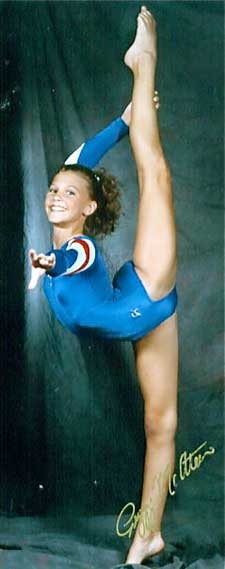Then after you retire, your body changes dramatically, and it's difficult to deal with the changes to your appearance. I was on all sorts of medications to heal from the mono, and I needed medical care to help my body produce everything it needed in order to develop at that age. It was really difficult. You're no longer training and eating in the same way, but those attitudes toward food and the body remain. So I ended up developing eating disorders. Rhythmic gymnastics had left its claim on my mind and not just my body.
The only way I got free from the anorexia and bulimia and everything else in between was by turning to God and finding my identity in Christ. During my gymnastics career, the coaches always focused on my weight instead of my talent. It was drilled into me that my weight was the most important thing about me, so when I got out of the sport I really focused on that.
Of course, my parents taught me that God was the most important thing. But after I retired I obsessed about what I had heard in the gym everyday: "You are what you weigh."
How was the pressure to lose weight communicated to you?
Some coaches did not do these things, and some did. We were weighed every day. Some coaches would tape measure your waist and your thigh. My teammates get upset with me when I talk about this, because they don't think it's abusive. They went to the Olympics and they're happy about how their careers worked out.
Yet some of the things some of the coaches did were extreme and unhealthy. After 8 hours of practice, we would run a mile or two for conditioning and then get in a sauna. We wore the outfits wrestlers weigh in order to sweat and dehydrate their bodies. We had food journals where we wrote down everything we ate, and we were not allowed to eat until our coaches arrived and could approve what we were eating and how much. One of my coaches once told me that if you have the day off from practice, then you only need to eat 1 tablespoon of honey that day. For 100-pound teenage girls, those things are dangerous. They made me obsessed about it, and that had even more harmful consequences later.
You sacrificed a lot for your rhythmic gymnastics career, and endured a lot of hardships. Was it worth it?
The negative things that happened to me were not from God, but God turned it all around for the good. I seek to bring him glory in my life, to show how good God is. The enemy comes to kill and destroy, but Jesus came so that we can have life and have it more abundantly. Overall I'm grateful for the gifts God gave me and that I have been able to use them in the way that I have.
I'm thankful that He enabled me to travel the world and do wonderful things in the sport, and then He fully healed me of all the wounds to body and spirit. Now that I'm healed, I can look back and truly appreciate all the opportunities He gave me. And I did enjoy it. I loved working hard, training and performing. So yes, absolutely, I'm thankful for what I was able to do.
I also believe that everything I did in gymnastics was training for a lifetime of ministry. God was preparing me to travel the world and spread the good news of what He has done for us all.
 Finally, what sort of advice would you offer a young gymnast who is searching for a way to express or grow in faith in the midst of a gymnastics career?
Finally, what sort of advice would you offer a young gymnast who is searching for a way to express or grow in faith in the midst of a gymnastics career?
I would encourage youngsters in the sport to do work hard and strive for excellence and yet also to recognize that gymnastics is just one of many things they will do in their lives. It does not define who they are. Placing first in the standings does not make God love them any more, and placing last does not mean that God loves them any less. They should continue to work hard and enjoy the talents and opportunities God has given them, but they should remember that we are three-part beings: spirit, soul and body. Gymnastics is something we can do with our bodies. But our spirit, the inward man, is what remains even after everything else passes away.
I would also encourage young gymnasts to claim who they are in the eyes of God and not in the eyes of the world. I still love sports today. I love to teach ballet and lead clinics, but I have to remember that it all stems from who I am in God. The world wants us to believe that we must win in the world's eyes, accomplish the things the world values, in order to be valuable or accepted; the world will try to convince us to leave our relationship with God for what little time remains after we're finished pursuing the "more important" things.





